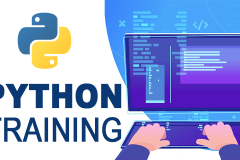Python Programing course is ideal for:
Beginners: Absolute newcomers with no prior coding experience.
Professionals Switching Careers: Individuals from non-tech fields (e.g., finance, healthcare) aiming to enter tech roles.
Data Analysts/Scientists: Those needing Python for data manipulation, analysis, or machine learning.
Students: High school or college students preparing for STEM fields or coding internships.
Developers: Programmers familiar with other languages (e.g., Java, C++) seeking to add Python to their toolkit.
Automation Enthusiasts: IT professionals or hobbyists interested in scripting, automation, or tool-building.
2. Topics Students Will Learn:
The course covers core Python concepts and practical applications, including:
Foundational Skills
Python Basics: Syntax, variables, data types, operators, and control structures (loops, conditionals).
Functions & Modules: Writing reusable functions, importing modules, and using built-in libraries.
Object-Oriented Programming (OOP): Classes, objects, inheritance, and polymorphism.
Error Handling: Using try-except blocks to manage exceptions.
Intermediate & Advanced Topics
Data Structures: Lists, tuples, dictionaries, sets, and comprehensions.
File Handling: Reading/writing files (CSV, JSON, text) and working with directories.
Libraries & Frameworks:
Web Development: Basics of Flask/Django for building web apps.
Data Analysis: Pandas, NumPy, and Matplotlib for data manipulation and visualization.
Automation: Scripting with os, sys, and requests for tasks like web scraping or file management.
APIs: Consuming RESTful APIs and building simple APIs with Flask.
Database Integration: SQL basics and connecting to databases (e.g., SQLite, PostgreSQL) using sqlite3 or SQLAlchemy.
Tools & Best Practices
Version Control: Basics of Git and GitHub.
Virtual Environments: Managing dependencies with venv or pipenv.
3. Outcomes After Completing the Course:
By the end of the course, students will:
Master Core Python: Confidently write scripts using Python’s syntax, OOP principles, and data structures.
Build Real-World Applications: Develop functional tools, such as:
Web apps (e.g., blogs, e-commerce prototypes).
Data analysis reports/dashboards.
Automation scripts (e.g., file organizers, email bots).
Work with Data: Clean, analyze, and visualize datasets using Pandas and Matplotlib.
Integrate APIs & Databases: Fetch data from APIs and store/retrieve it from relational databases.
Adopt Industry Practices: Use Git for collaboration, write testable code, and follow coding standards.
Prepare for Specializations: Be ready to dive into advanced fields like:
Machine Learning (with libraries like Scikit-learn, TensorFlow).
Web Development (Django/Flask).
DevOps/Cloud Engineering (scripting for AWS/Azure automation).
Career Opportunities: Graduates can pursue roles such as:
Python Developer
Data Analyst/Scientist
Backend Developer
Automation Engineer





